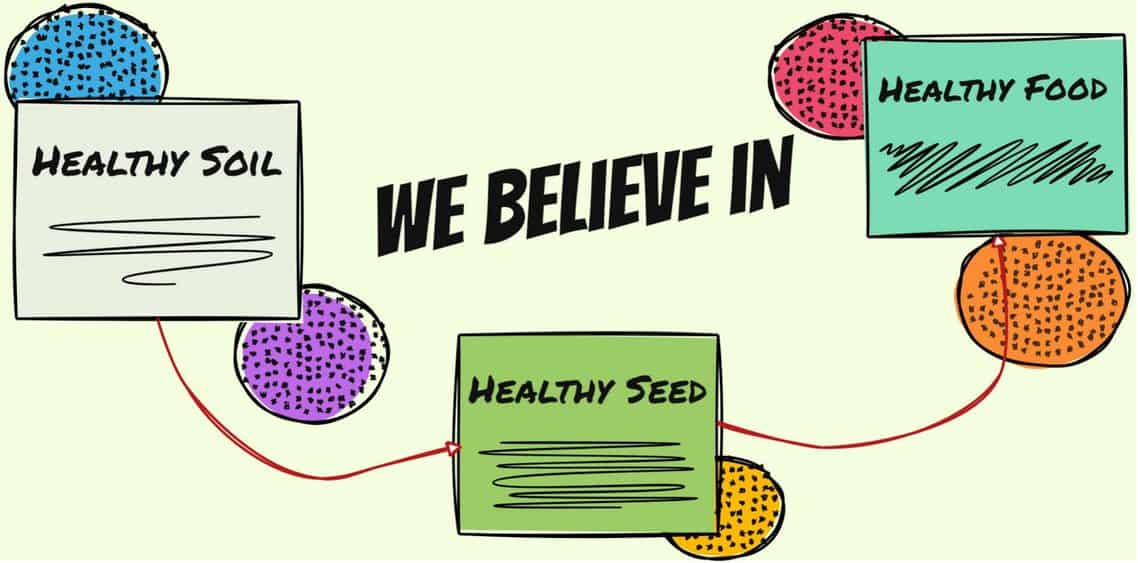
Discovering Your Garden’s Terroir
Heirloom Seeds and Expert Guidance
Our Roots
At Terroir Seeds, we believe gardening connects us to the earth, nourishes us, and helps create a better world, one garden at a time.
Like many gardeners, we – Cindy and Stephen – began our journey with a simple desire: to grow truly delicious food.
Stephen’s love of cooking led him to the garden, seeking flavorful ingredients missing from local markets. This path to the garden revealed the intricate relationship between soil, seed, food, and the people who cultivate it.
Cindy, with her 40 years of gardening experience, greenhouse management degree, and deep understanding of ecological principles, brought a complementary perspective, emphasizing soil health’s crucial role in the cycle of growth and in achieving that exceptional flavor.
Learning From the Soil
Our shared passion for gardening and a lifelong commitment to learning led us down a unique path.
For nearly 30 years, we’ve worked alongside ranchers, private groups, and government agencies in central Arizona, learning Holistic Management principles to restore and revitalize grasslands, rangelands, and riparian areas. These hands-on experiences provided us with invaluable insights into the complexities of soil biology and the art of soil rehabilitation.
More importantly, we learned how to translate these large-scale principles into practical techniques for the home garden. These experiences gave us a profound understanding of how healthy soil creates healthy plants and exceptional flavor – shaping our approach to seed selection and cultivation, a philosophy we call “seedsmithing”: working with seeds to enhance their unique characteristics, drawing on the lessons of the land.
Human-Scale Agriculture
Our focus has always been on home gardeners and small-scale growers – what we call human-scale agriculture.
We understand your challenges and aspirations because they are our own.
We believe in building the means, and cultivating the skills and knowledge, for you to grow your own food, connect with nature, and build healthier communities – and it all starts with a single garden.
Gardens make better people, and cultivating one is a powerful first step.
More Than Just Seeds – Seedsmiths
We’re not just offering seeds; we’re sharing our knowledge and experience to help you succeed.
We’ve seen firsthand how older heirloom varieties often thrive and produce exceptional flavor in challenging environments. We work with a network of dedicated growers to bring you the highest quality heirloom seeds, carefully selected, tested, and tasted in our own gardens.
Because of this, we’re committed to providing not only exceptional seeds but also the expert guidance you need, as seedsmiths, to help you grow your best garden yet.
The Essence of Terroir
Terroir describes the unique “taste of place” that comes from a specific environment.
In your garden, this means the combination of your soil’s composition, the local climate (sunlight, rainfall, temperature), and your unique gardening practices (watering, fertilizing, even the varieties you choose). All of these factors interact to influence the flavor and character of your harvest. We believe that every garden has its own special terroir, and we’re here to help you cultivate it.
Terroir is more than just a catchy word; it’s our philosophy.
Sustainability and Community
Our commitment to sustainability extends beyond our gardens.
We were the first seed company selected by the Xerces Society to grow Antelope/Spider milkweed, and we’re proud partners with AZ Milkweed for Monarchs, offering 12 Arizona native milkweed species. We’ve also learned from the best, including seed-saving pioneer Suzanne Ashworth, and were honored to be among the first seed companies selected as delegates to Slow Food International in Turin, Italy, in 2012.
Experience and Expertise
With almost two decades in business with Terroir Seeds (and even longer with Underwood Gardens) and nearly 30 years of growing experience in the arid Southwest, we’ve learned firsthand the challenges and rewards of gardening in demanding conditions.
We live and work from our property outside of Chino Valley, Arizona, where we continually refine our growing techniques, testing countless seeds in our gardens and turning the produce into delicious recipes in our kitchen. Our online store and educational website offer a carefully curated selection of seeds that we know and love, all backed by the practical knowledge to help you achieve outstanding results. We share our insights freely, with information on everything from seed selection and soil improvement to delicious recipes.
Our goal isn’t to be the biggest seed company, just the one that best serves the needs of passionate home gardeners.
Grow With Us
Because healthy soil grows healthy gardens, we provide the heirloom seeds and expertise to help you connect the dots between soil, seed, and the food you eat.
Explore our selection of heirloom seeds, learn from our expert advice, and start growing your most flavorful, rewarding garden today!
What Our Customers Say
“I order from a number of seed companies and like all of them, but compared to the others, Terroir Seeds customer service is beyond excellent! Please keep up the good work!”
Just a note to say Hi, and THANK YOU for all my wonderful seeds! This is my 1st garden in New England, and myself and all my neighbors are wowed. You have such a wonderful variety of seeds – I quickly ran out of space in my 35×15 garden (I planted a little bit of everything). You’ve made a repeat and referral sale with me – I tell everyone where I got my seeds from!
I have Master Gardener friends who complain about the germination rate of the seeds they have bought from other companies. I have been extremely happy with everything I ordered from you. I love the fact that they are all heirloom.
